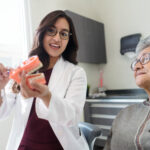Archives
Innovations in testing can lead to earlier and more accurate diagnosis
25 February 2025

Exciting breakthroughs in dementia research are making it easier to diagnose the condition earlier and more accurately. The sooner a person is diagnosed, the better their chances of getting the right support and treatment. One study, led by Stephen Ball at the University of Manchester, is looking at how the brain understands words and concepts. […]
10 reasons to be hopeful for the future of dementia research
24 February 2025

Today marks 10 years since Join Dementia Research began helping people take part in vital dementia research across the UK. The service was set up on 24 February 2015 by Professor Martin Rossor and Adam Smith of the University College London (UCL) Institute of Neurology. Join Dementia Research enables people to register their interest in […]
Why having conversations about end-of-life in dementia is so important
18 December 2024

In any area of healthcare, the topic of end-of-life is very difficult. It’s hard to talk about for people with a diagnosis, their families and healthcare professionals. But it is important to discuss, particularly with people living with dementia. Research has shown that people who have had end-of-life care conversations early on have an improved […]
2024 in dementia research
17 December 2024

As 2024 draws to a close, we look back at some of the breakthroughs in dementia research and the achievements and milestones of the Join Dementia Research service. More volunteers sign up to Join Dementia Research than previous year More than 80,000 volunteers have now signed up to Join Dementia Research since its inception in […]
New animation launched to explain Join Dementia Research service
23 September 2024

To mark World Alzheimer’s Month, we’ve created a new animation to explain the Join Dementia Research service to the public and encourage even more people to sign up. The 2-minute long video covers how to sign up, what happens after signing up, how the service works and the types of studies you can take part […]
Significant breakthroughs in dementia research
26 February 2024

As Join Dementia Research celebrates 9 years of matching volunteers to dementia studies, it is timely to reflect on the progress dementia research has made both with our help and more broadly in recent years. It is encouraging to know that at any one time, there are around 150 dementia research studies underway in the […]
Remembering Wendy Mitchell
23 February 2024

We would like to pay tribute to our friend Wendy Mitchell who sadly passed away this week. Wendy was known and loved by many for her resilience and for her candid insights into what it is like to live with dementia. She defied the odds by writing three books – including Sunday Times bestsellers – […]
Participants needed for study into whether good oral health can slow memory loss
22 January 2024

A study into whether brushing teeth daily can slow memory loss in people with early stage Alzheimer’s disease is recruiting participants through Join Dementia Research. The MySmile study, led by the University of Bristol and supported by the National Institute for Health and Care Research (NIHR), is recruiting people aged 60 and over with either […]
New studies recruiting carers through Join Dementia Research
5 December 2023

The mental health of family members caring for people with dementia is rightly an area of increasing importance. A number of studies that are looking at precisely this area are recruiting dementia carers through Join Dementia Research. The following studies are all supported by the National Institute for Health and Care Research (NIHR). iACT4CARERS A […]
Jessica Baggaley: Using Join Dementia Research to recruit participants
5 October 2023

Jessica Baggaley is a trainee clinical psychologist at the University of Hull. She carried out a research study as part of her doctorate in Clinical Psychology which looked at measuring self-compassion with people living with dementia. Self-compassion is defined as being kind and understanding towards ourselves. About the study In this research we wanted to […]
